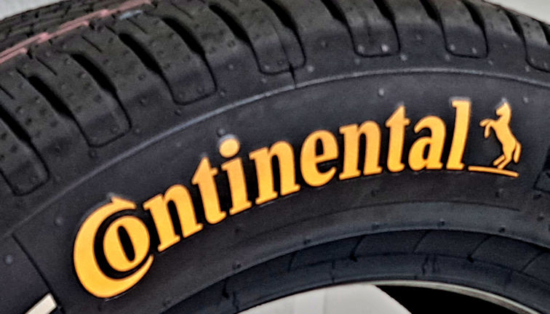Continental lifts Tires EBIT margin for 2023
 Photo: Stephen Goodchild / Tyre Industry Publications Ltd
Photo: Stephen Goodchild / Tyre Industry Publications Ltd
Continental has published its financial results for the three months to 30 September with the comment that Q3 2023 concluded “in line with expectations.” For the Tires group sector, the expectation was thus lower sales but an improved earnings position.
Consolidated Q3 2023 sales amounted to €10.2 billion, down 1.5 per cent year-on-year. Continental reported an adjusted operating result of €637 million, 7.1 per cent higher than in Q3 2022, corresponding to a 50 bps year-on-year rise in adjusted EBIT margin, to 6.2 per cent. Net income increased to €299 million, up from -€211 million a year earlier. Adjusted free cash flow was €466 million, as opposed to -€496 million in Q3 2022.
Group sector performance
According to Continental, the Tires group sector “had another good quarter.” Sales, at 3.4 billion, were admittedly down 5.4 per cent year-on-year due to declining volumes in the replacement tyre business, yet at the same time Tires improved its earnings position by increasing adjusted EBIT margin to 13.2 per cent (Q3 2022: 11.8 per cent). Continental credits this higher margin to an increased proportion of “premium” tyre sales as well as lower raw material costs.
Automotive group sector sales increased by 1.8 per cent, to €5.0 billion. With organic sales growth of 5.1 per cent before exchange-rate effects and changes in the scope of consolidation, Automotive slightly outperformed the market – global automotive production rose by around four per cent. The business’s adjusted EBIT margin was 30 bps higher year-on-year, at 2.8 per cent, and “significantly increased” compared to the first two quarters of 2023. Continental particularly attributes the improved earnings to price adjustments made in response to additional, inflation-related costs.
Continental describes Q3 2023 as “another stable quarter” for its ContiTech group sector. Sales were down 1.0 per cent year-on-year, to €1.7 billion. Adjusted EBIT margin rose 30 bps year-on-year, to 6.6 per cent, largely thanks to inflation-related price adjustments.
Significant ground to gain
“We ended the third quarter in line with our expectations,” states Nikolai Setzer, chief executive officer of Continental. “Our earnings were good in Tires and stable in ContiTech, and we made progress in Automotive, significantly increasing its earnings compared with the first half of the year. We will build on this in the fourth quarter and continue to improve.”
Chief financial officer Katja Garcia Vila (formerly Dürrfeld) adds that Continental has “also made progress in terms of adjusted free cash flow,” yet she stresses that the company still has “significant ground to gain” in the fourth quarter of 2023. “Our focus is on increasing our earnings and further reducing inventories and receivables in order to achieve an adjusted free cash flow of around €0.8 billion to €1.2 billion by the end of the year.”
Revised 2023 forecast
Looking at 2023 as a whole, Continental anticipates that global passenger car and light commercial vehicle production will increase by five to seven per cent year-on-year. This is higher than the three to five per cent it previously forecast. As for the global replacement tyre business, the company’s best-case forecast is a flat market. Should its most pessimistic projection prove the case, global aftermarket tyre sales could shrink by two per cent year-on-year in 2023.
Ongoing negative exchange-rate effects have prompted Continental to lower its sales outlook for Automotive, and it now expects group sector sales of around €20.0 billion to €21.0 billion (previously: €20.5 billion to €21.5 billion) and consolidated sales of around €41.0 billion to €43.0 billion (previously: €41.5 billion to €44.5 billion).
Continental has also slightly raised its adjusted EBIT margin outlook for Tires, thanks to this group sector having “performed well” despite declining replacement tyre markets in Europe and North America. The company now anticipates that the adjusted EBIT margin for Tires will be around 12.5 to 13.5 per cent (previously: 12 to 13 per cent).





Comments